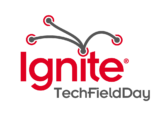|
|
 Brian Booden and Stephen Foskett presented Ignite Talks at AI Data Infrastructure Field Day 1 |
This Talk date is October 2, 2024 at 15:45-16:15.
Presenter: Brian Booden, Kurtis Kemple, Stephen Foskett
Agentic Al – A Look At the Future of Automation with Stephen Foskett
Watch on YouTube
Watch on Vimeo
Stephen Foskett considers agentic AI, a transformative approach to automation quite unlike popular generative AI models. Unlike traditional AI applications that rely on user inputs, agentic AI involves autonomous agents that act on behalf of users, automating various processes. These agents can either run continuously, collecting information and performing actions, or serve as the glue in business process automation tasks. Foskett emphasizes that agentic AI can handle unstructured inputs and generate well-formed outputs, making it a powerful tool for business process automation. He draws parallels to existing automation tools like Zapier and IFTTT but highlights that agentic AI goes a step further by incorporating a level of intelligence that can adapt to changing inputs and unexpected scenarios.
Foskett provides practical examples to illustrate the potential of agentic AI. He describes scenarios where these AI agents can manage complex tasks such as processing photos, sensors, or handling enterprise data like insurance audits. These agents can adapt to various data formats and incomplete information, making decisions and taking actions autonomously. For instance, an AI agent could convert a PNG file to a JPEG if needed or wait for an upload to complete before proceeding with the next steps. This adaptability makes agentic AI particularly valuable in fields like sales automation and cybersecurity, where the ability to respond to real-time data and adjust actions accordingly can significantly enhance efficiency and effectiveness.
However, Foskett also addresses the challenges and ethical considerations associated with agentic AI. While these agents can act autonomously, they are not infallible and can still make errors or “hallucinate” incorrect data. This necessitates the implementation of guardrails to prevent costly mistakes. Additionally, there are ethical concerns about the promises these agents might make on behalf of businesses, which could lead to unintended commitments. Despite these challenges, Foskett is optimistic about the future of agentic AI, seeing it as a paradigm shift that will revolutionize customer service, operations, and business process automation. He believes that the rapid adoption of AI agent-based platforms is inevitable and will be the next significant wave in AI applications.
Personnel: Stephen Foskett
WhatsApp for Qlik Sense SaaS by Brian Booden
Watch on YouTube
Watch on Vimeo
Brian Booden’s Ignite talk at AI Data Infrastructure Field Day 1 details the integration of WhatsApp with Qlik Sense SaaS, a business intelligence (BI) tool. Booden, with a background in data and analytics, highlights the importance of conversational analytics in today’s data-driven world. He explains that while Qlik integrates with various tools like Slack and Teams, WhatsApp is notably absent. This absence is significant because WhatsApp is widely used for personal communication, making it a more immediate and engaging platform for users. Booden emphasizes the unique engagement factor of WhatsApp, where users are more likely to respond to messages due to the platform’s notification system, which includes read receipts.
Booden outlines the technical architecture required to connect Qlik with WhatsApp, focusing on the need to minimize data transfer points for security reasons. He explains that the integration involves using WhatsApp APIs to facilitate direct communication between Qlik and WhatsApp, ensuring data protection and compliance with privacy regulations. The challenge lies in WhatsApp’s stringent policies, as it is part of Meta (formerly Facebook), which requires business messages to be pre-approved and triggered by specific actions. Booden has spent the last 18 months developing a solution to navigate these complexities, enabling seamless data interaction through WhatsApp.
In his live demonstration, Booden showcases two use cases: structured data interaction and unstructured data interaction using Qlik’s recently released LLM (Large Language Model) called Qlik Answers. The first demo involves pulling customer data from a Qlik dashboard and generating a PDF report, all triggered through WhatsApp. The second demo focuses on querying unstructured data, such as troubleshooting a printer issue, using natural language processing. Booden concludes by emphasizing the growing importance of conversational analytics, predicting that the demand for instant, mobile-friendly data interactions will continue to rise. He believes that integrating BI tools with widely-used communication platforms like WhatsApp can significantly enhance user engagement and efficiency.
Personnel: Brian Booden
Al Democratization – The Path to Mass Adoption by Kurtis Kemple
Watch on YouTube
Watch on Vimeo
Kurtis Kemple’s talk at AI Data Infrastructure Field Day 1 explores the democratization of AI and its potential to transform lives beyond the enterprise sector. He begins by highlighting the current focus of AI on improving business efficiency and productivity, which, while necessary, has limited the technology’s reach to a broader audience. Kemple shares his personal journey from incarceration to becoming a senior director at Slack, emphasizing how technology, particularly AI, can be a transformative force for individuals who traditionally lack access to it. He argues that for AI to achieve mass adoption, it must become more accessible and user-friendly, addressing the needs of non-technical users who are currently excluded from its benefits.
Kemple identifies several barriers to AI adoption among the general public, including the complexity of AI systems, issues of intellectual property theft, and a significant lack of trust. He points out that the current AI landscape often requires users to become skilled prompt engineers to interact effectively with AI models, which is not feasible for everyday users. He draws an analogy to Steve Jobs’ introduction of the iPod, suggesting that AI needs to be as intuitive and user-friendly as revolutionary consumer products. Kemple stresses that the blank canvas problem, where users are presented with an empty text field and little guidance, is a major obstacle to AI’s widespread adoption.
To overcome these challenges, Kemple proposes a shift towards collective intelligence, where numerous specialized models are made accessible through a marketplace. This marketplace would support both free and paid models, offer no-code tools for fine-tuning, and provide educational resources to empower experts from various fields to create and share their models. He envisions an intelligent orchestration layer that can route user queries to the appropriate models, simplifying the user experience. Additionally, Kemple emphasizes the importance of building trust through open-source foundations, transparent data sets, and credible model training by recognized experts. By making AI more accessible, trustworthy, and tailored to diverse needs, Kemple believes that AI can truly transform lives and reach its full potential.
Personnel: Kurtis Kemple









